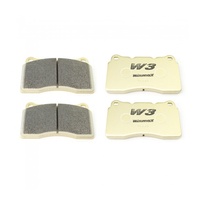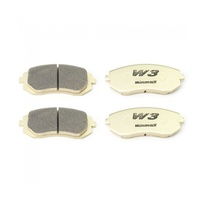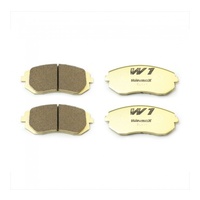Privacy Policy Statement
For the purpose of this Privacy Statement "group company" shall mean Car Mods Australia Pty Limited and any of its subsidiary or affiliate companies, including, without limitation, the companies listed above under CMA.
Our Privacy Commitments
Car Mods Australia Pty Ltd ("CMA") respects the privacy of every person who visits, registers with or subscribes to our websites and on-line publications, and is committed to ensuring a safe on-line experience. This Privacy Statement applies to CMA's website ("Site") as listed below under the heading "Site" and outlines the information CMA may collect and how we may use that information. This Privacy Statement also tells you how you can verify the accuracy of your personal information submitted to CMA through our Site and how you can request that we delete or update it.
This Privacy Statement consists of a general section, which applies to the Site, followed by specific sections on carmodsaustralia.com.au and Sites that provide supplementary information about the personal information collected on those Sites.
Information about CMA
- import, sale and distribution of motor vehicle parts worldwide
Car Mods Australia Pty Ltd Company Address:
3/24 Technology Drive, Arundel QLD 4214
CMA's primary goal in collecting personal information from you is to give you an enjoyable customised experience whilst allowing us to provide services and features that most likely meet your needs.
CMA gives you the option to access our Site's home page without subscribing or registering or disclosing your personal data.
We collect certain personal information from you, which you give to us when using our Site and/or enquiring about, purchasing or ordering our products and services.
We also collect certain personal data from other group companies to whom you have given information through their websites (including, by way of example, 4x4 Mods Australia Limited in accordance with the purposes listed below).
Where, as part of our Site services, we enable you to post information or materials on our Site, we may access and monitor any information which you upload or input in order to fulfil our obligations to you and protect or comply with our legal rights and obligations.
We do not collect information about our Site visitors or product enquirers.
Please note that we do not collect any personal information from children under thirteen years of age and that no child under thirteen should submit any personal information to the Sites. Should we discover that any such personal information has been delivered to the Sites, we will remove that information as soon as possible.
Types of Personal Information Held and its Use
On its Site, CMA collects personally identifiable information, such as your name, business name, work and/or home address, and telephone number and email address and comments/information you may input or post. CMA may collect demographic information, such as your postcode, age, gender, purchasing preferences and interests or may collect a combination of the two types of information.
CMA collects and uses your personal information to operate its Site efficiently and to deliver the products and services you have requested.
Your personal information may be used for the purposes of:
Customer Administration, i.e. part of the personal data is used for the provision of information, communications, or transaction services such as placing an order and delivering products and/or services to you.
- Marketing, i.e. parts of your personal data may be used by CMA to contact you by email, telephone and/or post for sending information or promotional material on the products and/or services of CMA.
- CMA uses cookies to help keep track of items you put into your shopping cart including when you have abandoned your cart and this data is used to determine when to send cart reminder messages via SMS.
- CMA gives you the opportunity to opt-out of receiving marketing communications and will in certain circumstances need to obtain your consent before sending such communications to you.
- Trading in Personal Data, i.e. parts of your personal data may be collected and processed with the intention of selling it to other organisations, but only after consent has been given by you.
- This information also helps us determine what is most beneficial for our users and how we can continually create a better overall service for you. Employees or contractors of CMA who are given access to your usage information will be required to keep the information confidential and not use it for any other purpose than to carry out the services they are performing for CMA.
CMA may also use your information to measure what area users visit most frequently and what information users access the most. We use this data in connection with the design of our website. This information also helps us determine what is most beneficial for our users and how we can continually create a better overall service for you. Employees or contractors of CMA who are given access to your usage information will be required to keep the information confidential and not use it for any other purpose than to carry out the services they are performing for CMA.
Any other purposes for which CMA wishes to use your personal data will be notified to you and your personal data will not be used for any such purpose without obtaining your prior consent.
Consents and opt-outs
You can give your consent to or opt-out of particular uses of your data as indicated above by informing CMA by email, post or phone.
Alternativelly you can:
- clicking an ‘unsubscribe’ link in an email
- replying to an email or text message with ‘unsubscribe’ or ‘STOP’
Use of Cookies
CMA's Site's use "cookies".
A cookie is a text file placed on your hard drive by a web page server. Cookies cannot be used to run programs or deliver viruses to your computer. They are uniquely assigned to you and can only be read by a Web server in the domain that issued the cookie.
Temporary cookies are a mechanism for maintaining continuity between pages during your visit. These cookies are maintained in your browser's active memory and are terminated at the conclusion of the Site visit. Permanent cookies are used to recall on subsequent visits your login information and your agreement to our terms and conditions.
Cookies are integral to the functioning of all CMA Site. By using your browser's options to block cookies you will effectively prohibit effective use of CMA site. If you still wish to control the operation of cookies, then functionality is available through your browser. Generally, you have the options to accept all cookies, to be notified when a cookie is issued or reject all cookies.
As outlined above, disabling cookies may prevent the CMA Site from operating fully.
Disclosures
Information collected at one Site may be shared within CMA for the purposes listed above.
Your personal data may also be sold to other companies in the form of lists and directories, but only after permission from you in accordance with the provisions above.
The above excludes text messaging originator opt-in data and consent; this information will not be shared with any third parties.
Please note that the Site may contain links to external sites and may contain advertisements for, and/or the opportunity for you to purchase products or services from third parties. Please note that this privacy statement does not control the activities of such third parties, and users should consult those third party sites' privacy policies.
Confidentiality Security of Your Personal Information
CMA is committed to keeping the data you provide us secure and will take reasonable precautions to protect your personal information from loss, misuse or alteration.
We have implemented information security policies, rules and technical measures to protect the personal data that we have under our control.
We also give you the option of using a secure transmission method to send us personal data identifiers, such as credit card details and bank account number.
How to Access, Update and Erase your Personal Information
If you wish to know whether we are keeping personal data about you, or if you have an enquiry about our privacy policy or your personal information held by CMA, in relation to the Site you can contact the Data Protection Officer via
CMA allows you to challenge the data that we hold about you and, where appropriate in accordance with applicable laws, you may have your personal information:
- erased
- rectified or amended
- completed
Security Measures
CMA has adopted the legally required levels of security for the protection of Personal Data, and they try to install those other additional technical means and measures within their reach to prevent the loss, misuse, alteration, unauthorized access and theft of the Personal Data provided to CMA.
CMA is not responsible for any hypothetical damage or loss of damages that may arise from interferences, omissions, interruptions, computer viruses, telephone breakdowns or disconnections in the operational functioning of this electronic system, motivated by causes unrelated to CMA; of delays or blockages in the use of this electronic system caused by deficiencies or telephone line overloads or process centre overloads the Internet system or other electronic systems, as well as in other electronic systems, as well as damages that may be caused by third parties through illegitimate intrusions beyond the control of CMA. However, the user must be aware that the measures of Internet security are not impregnable.
Content and Use
The user is informed and accepts that access to e-commerce does not imply, in any way, the beginning of a commercial relationship with CMA.
The head of the e-commerce does not identify with the opinions expressed in it by his collaborators. The company reserves the right to make unannounced changes it deems appropriate in e-commerce, may change, delete or add both the content and services provided through it and the way in which they are presented or located on its servers.
Intellectual Property
The intellectual property rights of the e-commerce content, its graphic design and codes are the property of CMA and, therefore, their reproduction, distribution, public communication, transformation or any other activity that may be carried out with the e-commerce content is prohibited, even if the sources are not cited, unless CMA gives its written consent. All trade names, trademarks or distinctive signs of any kind contained in the company's e-commerce are the property of their owners and are protected by law.
Links
The presence of links in CMA’s e-commerce has merely informative purpose and in no case suppose suggestion, invitation or recommendation on the same.
Changes to this Privacy Statement
CMA will occasionally update this Privacy Statement to reflect new legislation or industry practice, group company changes and customer feedback. We encourage you to review this Privacy Statement periodically to be informed of how CMA is protecting your personal information.
This Privacy Statement applies to the websites located on the World Wide Web, including but not limited to, the following domains
www.carmodsaustralia.com.au





